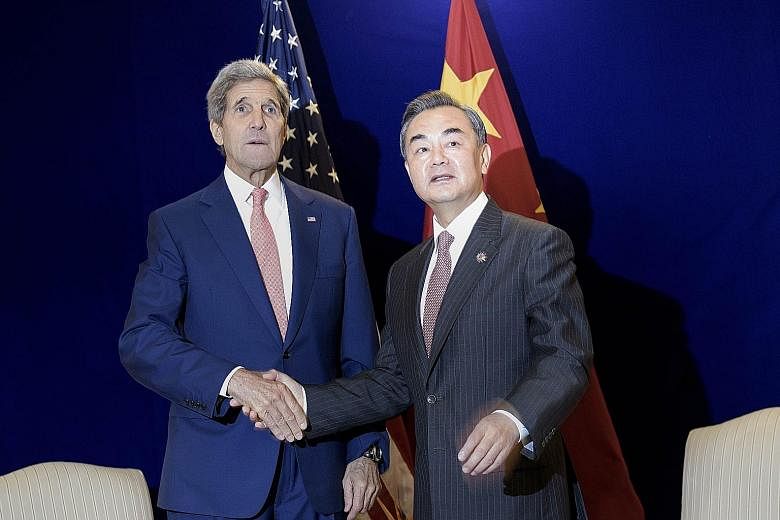Chinese Foreign Minister Wang Yi said yesterday that China had halted land reclamation in the hotly disputed South China Sea, an issue that has raised tensions with Asean countries claiming parts of the potentially resource-rich waters.
"You want to see who is building, then take a plane and have a look," Mr Wang told reporters when he was asked whether China was still working on the Scarborough Shoal, which is also claimed by the Philippines.
"China has already stopped," he said, when pressed on the reclamation issue after a press conference that followed a meeting with his Asean counterparts.
His remarks came a day after the Philippines, which has taken its dispute with China to an international tribunal, backed a proposal by the United States to halt all reclamation in the South China Sea, through which US$5.3 trillion (S$7.3 trillion) in trade passes each year. Apart from the Philippines, the other Asean claimant states are Vietnam, Malaysia and Brunei.
On Tuesday, when asked whether China was building additional airstrips on its reclaimed islands, Mr Wang had said: "Why don't you ask the Philippines?"
Philippine Foreign Secretary Albert del Rosario had told his Asean counterparts on the same day that China's "massive reclamation activities... have undermined peace, security and stability in the South China Sea".
China has been at odds with Asean and the US on how to proceed with talks on the South China Sea, most of which it claims as its own. Its officials insisted that the Asean meetings were not the right place to discuss the issue.
But Asean chair Malaysia said at the opening of the meeting on Tuesday that the maritime dispute was a "prime example" of how the Asean grouping should play a "vital part in effecting an amicable settlement".
US Secretary of State John Kerry also said when opening a meeting with Asean foreign ministers that after "a good meeting" with Mr Wang yesterday, he hoped that at the talks with the Asean ministers, "we will find a way to move forward effectively together".
Although Mr Wang insisted that an elusive Code of Conduct to manage territorial disputes in the South China Sea should not be discussed at the Asean meetings, he put forward a three-point proposal for "promoting peace and stability in the South China Sea" during the meeting with the Asean foreign ministers.
He said countries bordering the sea should speed up the finalisation of the code and explore ways to manage maritime risk, as well as uphold freedom of navigation and overflight in the South China Sea.
However, a third element that calls on "non-regional countries" to "refrain from actions that may heighten tension or escalate the situation" goes against Asean's stand that the South China Sea is of importance to global stakeholders.
"The South China Sea is of mutual concern, not just for Asean, not just for China... you cannot limit the discussion to only members of Asean and China," Asean Secretary-General Le Luong Minh told The Straits Times.
Singapore formally took over as country coordinator for Asean in its dialogue with China yesterday. Singapore Foreign Minister K. Shanmugam told reporters that the regional bloc cannot "wish away or pretend South China Sea" issues do not exist and that member states are "not happy" with the progress made so far.

